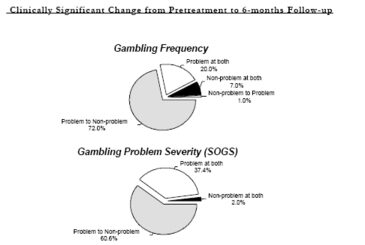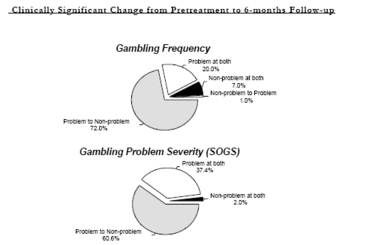A recent study of six state-supported gambling treatment programs in Minnesota evaluated the treatment outcomes of 944 clients seeking help for gambling problems. Determining the criteria for “treatment success” is a necessary step in this evaluation. While some might consider abstinence the appropriate measure of success, others consider meaningful change in behavior to be treatment success. Stinchfield & Winters (1996) presented three alternatives of treatment outcome measures: 1) abstinence rates, 2) tests of statistical significance, and 3) clinical significance of change. Abstinence rates are dichotomous (abstinent or not abstinent). This simplification may obscure gamblers’ gradual improvement over time. Tests of statistical significance between pretest and posttest assessments may not necessarily reveal whether the statistical change is clinically relevant. This approach also emphasizes group statistics, not individual outcomes. Finally, clinically significant change (shown below) can be measured by scores moving from the clinical (problem) range of behavior to the normative (non-problem) range of behavior. For gambling frequency, weekly or more frequent gambling indicated “problem” gambling while monthly or less frequent gambling indicated “non-problem” gambling. Gambling problem severity was measured by the SOGS, where a score of 5 or higher was considered “problem” gambling. Stinchfield & Winters prefer the third approach, as it measures change from pretreatment to posttreatment as well as providing outcome results for individual clients. This study found improvement from pretreatment to posttreatment using each of the three methods.
Source: Stinchfield, R. & Winters, K.C. (1996, April). Treatment effectiveness of six state-supported compulsive gambling treatment programs in Minnesota. Minneapolis, MN: University of Minnesota Medical School.
This public education project is funded, in part, by The Andrews Foundation and the Massachusetts Department of Public Health.
This fax may be copied without permission. Please cite The WAGER as the source.
For more information contact the Massachusetts Council on Compulsive Gambling,
190 High Street, Suite 6, Boston, MA 02110.





